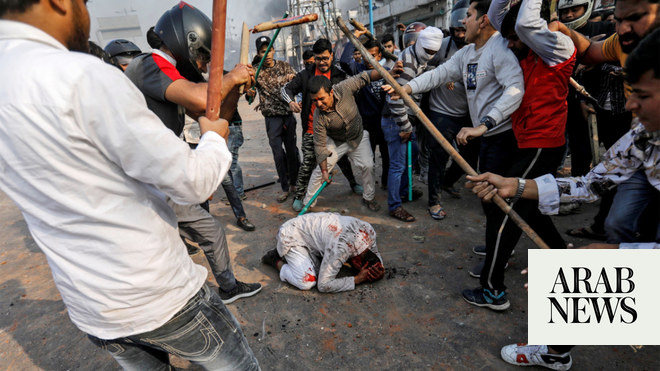
NEW DELHI: Breaking his silence on the growing trend of Islamophobia in the country, Indian Prime Minister Narendra Modi took to Twitter on Sunday to urge for “unity and brotherhood,” insisting that the coronavirus disease (COVID-19) did not attack people based on “race or religion.”
“Our response and conduct thereafter should attach primacy to unity and brotherhood. We are in this together. We are together facing a common challenge. The future will be about togetherness and resilience,” Modi added.
The premier’s statement follows a surge in anti-Muslim rhetoric after officials alleged a gathering of the Delhi-based Tablighi Jamaat (TJ), an Islamic missionary group, might have led to a rise in COVID-19 cases in early March.
“Out of the 14,378 positive COVID-19 cases countrywide, 4,291 of them were linked to the congregation in Delhi’s Nizamuddin area,” Lav Agarawal, spokesperson for the Ministry of Health, said on Sunday during a regular press briefing.
The statement was met with much criticism from several quarters, with Harjit Singh Bhati, president of the Delhi-based NGO Progressive Medicos and Scientific Forum, objecting to the “singling out of the Tablighi.”
“When the government starts singling out a particular group for the spread of the virus, this creates an anti-Muslim mindset among people. The surge in anti-Muslim attacks in India cannot be divorced from such messaging from the government,” Bhati told Arab News.
The stigmatization of the TJ is one of several examples of the growing marginalization and abuse facing Muslims.
A recent example is that of the Valentis Cancer Hospital in Meerut, 100 km west of Delhi, which published an announcement in newspapers on Friday saying that “any Muslim (patient) or his attendant who wishes to enter the hospital for treatment must produce a COVID-19 negative certificate.”
The announcement blamed the TJ for the “unprecedented” spike in COVID-19 cases. A day later, after heated criticism, the hospital was forced to issue an apology.
“The announcement was not meant to hurt anyone’s religious feelings. It was an attempt to ensure everyone’s safety, including that of Muslims,” Dr. Amit Jain, a member of the managing committee of the hospital, told media after a police case was filed against the hospital.
The incident follows closely on the heels of another one on Sunday wherein a Muslim woman from the eastern Indian state of Jharkhand alleged that she had suffered a miscarriage after she was denied entry into a local hospital in Jamshedpur.
Rizwana Khatun, 30, had rushed to the hospital after she began bleeding. Instead of being admitted, however, she was asked to “clean up her own blood” and was physically assaulted.
“I was beaten with slippers by the hospital staff, who accused me of spreading the virus. I was in intense pain, and I was immediately rushed to a private hospital where the doctors said that the child was dead,” Khatun said in a letter to the state chief minister.
Bhati said that the reports were “very disheartening thing to hear.”
“Medical students are taught to dedicate themselves to the service of humanity. The higher authorities allowed the environment to deteriorate this way,” he said.
Analysts reason that the increasing polarization was long in the making.
“The growing polarization has certainly affected everyday life in Muslim communities in India. The media-driven, anti-Muslim public rhetoric will further demonize Muslims and could lead to a major crisis,” Dr. Hilal Ahmad of the New Delhi-based think tank Centre for the Study of Developing Societies told Arab News.
Dr Apoorva Anand of Delhi University agreed.
“India has become a proper majoritarian state. What we have been seeing is a failure of the international community and of Indian institutions, including the supreme court, parliament and media. Under the pretense of fighting the virus, police in Delhi are arresting Muslim activists who protested against the discriminatory citizenship law a few months ago,” he added.












